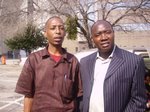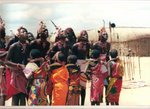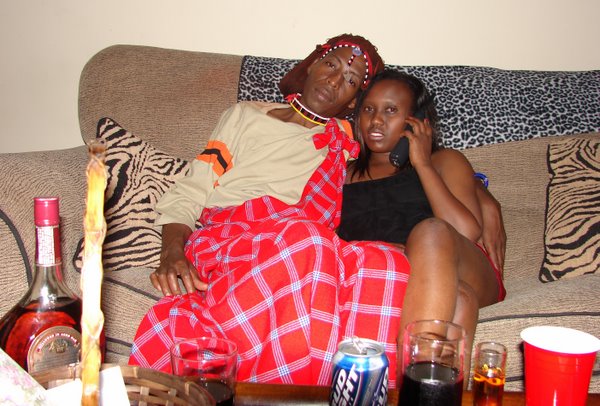By Karithi A. Ngeera
The rot in Kenya can be squarely blamed on poor quality leadership. This in turn results from voters electing incompetent leaders at all levels due to their poor understanding of democracy and elective politics. Although Kenyans have attained reasonable levels of civic awareness since the clamour for multipartism started in 1990s, more needs to be done in form of civic and voter education.
Voter education is the dissemination of information, materials and programmes designed to inform voters about the specifics and mechanics of the voting process for a particular election. It covers issues like ; who is eligible to vote; where and how to register; checking voter lists in advance; what type of elections are being held; where, when and how to vote; who the candidates are; how to file complaints; election violence and other malpractices; voting methods and systems and any changes in election law among others.
Civic education on the other hand is broader and is aimed at motivating citizens to participate in elections and other democratic activities. It conveys knowledge of a country’s political system and context covering issues like; the system of government; the nature and powers of the offices to be filled in an election; the principal economic, social and political issues facing the nation; the value of democracy; the equal rights of all citizens; the importance of peace and national reconciliation, manner in which an honest election can contribute to peace, development and growth of democracy among others.
Voter education is effective when linked with a programme of civic education that puts the election into context and provides an explanation of the election’s purpose, the surrounding issues, and their significance. Since electoral and governance systems change over time, it is vital that civic education is continuous and hence the need to integrate it into the school system so that young citizens can appreciate and embrace democracy and elective politics early in life.
A massive voter and civic education is particularly vital and urgent in the run up to the 2007 general election due to the following:
The perennial low participation of women, youth and other marginalized groups needs to be arrested. Effective education accompanied with creative mobilization campaigns would bring more of them on board because when such an important constituency excludes itself from elections due to ignorance, apathy and sheer laziness, this makes a joke about the “freeness, fairness” of such an election.
Low voter registration is another problem that undermines the usefulness of elections. Regrettably, some areas only register thirty percent of the eligible voters. These people unwittingly lock themselves out of an important decision-making activity that often determines a country’s destiny increasing their own marginalization. Effective education and awareness campaigns can boost this figure to more reasonable levels like seventy percent.
Shocking still is the fact that even among the registered voters; a big number does not turn out to cast their ballots. This reeks of laziness and lopsided priorities among voters resulting from ignorance about the crucial role played by political leadership in their lives. This “non voting group” commits serious crimes against democracy because it “votes in” bad leaders by default because it fails to block them from being elected. This group needs help in form of education and awareness creation.
Voters who participate in election violence, bribery and other malpractices are a liability to the growth of democracy in Kenya. Effective education would liberate them to realize that by being used to do dirty work by politicians, they auction their destiny, that of their children and all their future generations. Informed voters who cannot resist bribes due to poverty can still make a right choice, since actual casting of the ballot is secret. It is worth noting that election violence is one of the factors that discourage women from participating in elections as both voters and candidates.
Voter education will also reduce retrogressive cultural practices that bar women and youth to participate in communal activities which includes political meetings, standing for elections and even voting. It will also reduce ridiculous practices whereby women are expected to vote according to instructions given by their husbands or parents.
Free, fair and genuine elections are also new in Kenya having taken root with the beginning of multipartyism in 1990s. During the single party dictatorship, elections were mere rituals of endorsing candidates “supported from above”. Voters therefore developed a mentality that their vote is inconsequential since elections were always rigged, sometimes in advance. People need to be educated now to realize that times have changed and their vote actually counts.
Regardless of the democratic steps that we have taken, Kenya is still in transition from single party dictatorship to a true democracy. Education is required to get the voters out of the old “victims of dictatorship mentality” and develop a new mindset of “liberated citizens” who determine their destiny as well as familiarize them with the new democratic institutions that we have been establishing and nurturing. There are also some archaic laws that parliament has scrapped but continue to be applied by local administrators because of people’s ignorance.
The many spoilt votes that are proudly announced by election officials should jolt our attention to the fact that these are people’s choices that electoral process miserably fails to capture and which may actually change who gets elected. Effective voter education can reduce this unnecessary “wastage of people’s genuine decisions”.
That tribalism greatly Kenya’s voting pattern is a great indictment on our failure as a country to educate the masses. It is only a very backward and ignorant voting population that equates belonging to the same tribe with possessing leadership qualities. This education, done effectively can root-out political miscreants who hide under tribal cocoons and continue conning their way back to leadership positions.
High illiteracy levels in Kenya means that many people do not understand democratic processes and elections. Illiterate voters need special packages in vernacular, simplified, and adapted to their specific situations and areas.
Special voter education programmes are also required for minority groups, internally displaced persons and other marginalized segments of society who naturally have high degrees of apathy. It will make them understand their rights and the importance of participating in elections and that by choosing good leaders they are attacking their marginalization and bringing themselves to the mainstream of the society.
Civic educators should also take advantage of tolerance for divergent views being experienced under this regime to educate the voting masses and make a lasting impression. It is worth noting that the 2002 general election became successful and largely free and fair because of the massive education campaigns that were conducted before the elections.
How should this education be conducted?
Given that elections are highly political, it is of paramount importance that civic and voter education is neutral, accurate and professionally done so that it is not seen to be favouring any political party or candidate. One coordinating body should ensure quality control and Electoral commission of Kenya would be the best suited for this role.
To be effective, the trainings should be multifaceted and a mix of approaches should be employed like: direct mailings to voters, street theatre, role playing, radio spots, jingles, songs, comic strips, Internet campaigns, brochures and pamphlets. This would reduce monotony and make the voters interested to learn. The trainings should also be gender sensitive, all inclusive and community-based.
In the long run voter and civic education should be integrated in school curriculum so that when children reach voting age they will already understand the basis of the national and local politics and electoral systems.
Who would participate in conducting this education?
Women and youth associations and groups are best placed to reach their members. They can be assisted to come up with messages that resonate with their members. The on-going Vijana Tugutuke campaign is a good attempt at this and should be rolled out countrywide not in selected number of urban centres.
The churches, synagogues, temples and mosques who are in touch with voters among their congregation at least once a week should utilize every opportunity, possibly take a few minutes after their services to instil civic awareness and also continuously carry out civic and voter education. The church has a sacred duty to guide their flock in matters that are important to their lives. Although man does not live on bread alone, it will be difficult to spread the word of God among hungry and sick congregation, hence their flock need a functioning democracy and economy to achieve some basic level of worldly comforts. The clergy cannot teach hungry people not to steal and expect to succeed.
Charitable organizations and related members of the civil society can bring their experience of developing educational materials into this. We have seen their excellent creativity in developing and disseminating materials for HIV/Aids education campaigns. They can also provide funding and logistics for implementing these trainings on the ground. They are also good at gender mainstreaming and can add the gender angle into the whole programme.
Political parties through their membership and organs are also a good vehicle for this education. These parties should stop senseless propaganda and ran genuine awareness campaigns that can take democracy in Kenya to the next level.
The media can play a key role in breaking down negative stereotypes of women, youth and marginalized people and encouraging their full participation. Media owners and managers should allow some free or at least subsidized airtime to civic educators to talk directly to the voters. They should allocate some free time for continuous civic and voter education as part of corporate social responsibility.
The electoral commission of Kenya would play a vital coordination and quality control role by: harmonizing the curriculum, vet all materials and participating organizations, developing and disseminating comprehensive guidelines, monitoring for impartiality and professionalism to ensure the trainings are accurate and politically neutral.
ECK can also utilize the various opportunities it interacts with voters to pass on these important messages for example: during registration, when they check the register, when the change voting station among other golden opportunities. Their offices countrywide should be manned by trained officers who can pass these voter and civic education messages and respond to the questions of the voters through out, whether it is election year or not.
The international community other than endlessly grumbling about corruption and bad governance can take this golden opportunity to support education of Kenyans to be able to solve their own governance problems. They have the funds and the expertise in developing training materials and also offer logistic support to training implementers. Bad mouthing Kenya for all sorts of governance and leadership shortcomings without taking positive action supporting civic and voter will is of no use to anybody.
Teaching a society how to fish is more important than supplying them with a thousand years supply of fish. All friends of democracy in Kenya should come together and launch a massive voter and civic education campaign in readiness for the 2007 election which will be the second ever genuine election in Kenya’s history. Kenya’s leadership and governance problems will only be solved by Kenyans themselves if they are empowered to participate in democratic activities and make right political decisions through education and awareness campaigns.
-The writer is a Business Consultant Based in Nairobi
Other Insights
Tuesday, July 24, 2007
GAINS AND LOSES,THE STAKES BEHIND MINIMUM REFORMS
By KARITHI NGEERA
As the reforms debate gains momentum, it is important to look critically at the proposed reforms, try to unveil the thinking behind it and the rationale for the positions being taken by both sides of the political divide. Let us take each proposal separately and critically evaluate it.
First, the Head of State is to be barred from appointing Opposition MPs into Government without negotiating with their parties. The reform proponents claim that this is meant to stop a sitting president from killing opposition parties by poaching MPs into the government. But does the president force any opposition MP to take up the position? My view is that the proposal is being pushed by opposition chiefs because they have no grip on their MPs who switch loyalty according to where there bread is being buttered. This is because politics in Kenya is for personal gain not for the party or serving the country. Moreover Kenyan political parties are devoid of ideologies, based on personalities and tribal affiliations instead and therefore one party is “as good as the other”.
The proposal is therefore meant to protect the tribal party chiefs against decamping of MPs who can very easily be lured by promises of ministerial positions, huge bribes and plum positions for their friends, kin and cronies. With MPs effectively caged, party chiefs can now use their voting strength in parliament to intimidate and blackmail the government in power by for example voting out important government motions and programmes. This has the potential of crippling government operations if political battles get out of control. LDP/ODM learnt a bitter lesson when Kibaki trashed the MOU, formed the government of national unity and after the referendum when the president refused to negotiate with them as a party and sacked the LDP ministers. This is a loophole LDP/ODM-Kenya is trying to seal.
The second proposal is to take away the power of the president to dissolve, summon or prorogue parliament. Taken in the historical perspective, this is also a lesson learnt from Moi’s political gymnastics which Kibaki did not hesitate to copy after the defeat of his government in the last year’s referendum. Consider this; the opposition has always considered passing a vote of no confidence on the government even during Moi days. Last year, LDP was so charged and excited after the referendum triumph that talk was in the air for a vote of no confidence in Kibaki’s administration.
It is also a card LDP could have also played after Kibaki trashed the MOU. In both instances, the stumbling block has been the fact that in case of such a vote, the president together with the entire parliament would have to seek a fresh mandate. Most MPs fear that they would not survive such an election and this is the reason this frontier of political battle in never explored in parliament. This proposal is therefore meant to separate the fate of the government with that of MPs since the president cannot call for a snap election or scuttle an impending vote of no confidence by proroguing or suspending the National Assembly.
If this proposal passes, we are likely to see votes of no confidence motions being often used as another frontier of political battles in parliament. This strengthens the politicians who can kick out a government and a president elected by wananchi without reference to them and also without endangering their political careers.
Thirdly, there is the proposal that a presidential candidate must garner more than 50 per cent of all votes cast and 25 per cent in at least five provinces to win an election. This is a clever game of numbers being played on wananchi. The opposition learnt a lesson when Moi won the two multiparty elections on minority votes. This position was also strengthened by the Narc experiment where pooling together of tribal voting blocks commanded by the various tribal chiefs carried the day in 2002. The November 2005 referendum and results of opinion polls that have been conducted also have a bearing in this provision.
Let us then bring these 4 lessons together and see how they are related to this proposal: The Narc experiment taught us that the tribal chiefs coming together can easily combine their tribal voting blocks into an electoral victory. The opinion polls have given us the indicative size of the voting block under the command of each tribal chief. The referendum further taught us the power of combining tribal blocks and also reinforces another lesson learnt during the 2002 elections, that a sitting government can be handed an electoral defeat.
Let us now play the mathematical game: During November referendum, what is now Narc-Kenya garnered 43 per cent while what is ODM-Kenya took 57 per cent. This shows that on a one on one, ODM commands a larger vote factory. Additionally, an opinion poll conducted in July this year by Steadman Group allocates the following voting slices for each candidate as shown below; President Kibaki, 30 per cent, Kalonzo Musyoka, 27 per cent , Raila Odinga, 14 per cent, Uhuru Kenyatta, 13 per cent, William Ruto, 5 percent, Musalia Mudavadi, 2 per cent. These are very interesting working figures for the quantitative minded. Simple calculation therefore reveals that if the proposal is adopted none of the candidates would garner the requisite 50% plus votes in 2007. This will leads to a run-off that will just be a recreation of the November 2005 referendum.
The ODM line –up will combine their voting blocks which roughly add up to 60 percent guaranteeing them an electoral victory. Even if the 50 percent clause does not go through the current line-up of ODM-Kenya can very easily block the Narc-Kenya candidate from garnering the current mandatory 25 percent in five provinces. That is the reason ODM-Kenya has lined up a provincial representative for each of the eight provinces.
Fourthly, the number of ministers should not be less than 15 and not more than 25. This limits the number of ministerial positions that the president has to entice opposition MPs with. This takes care of another important opposition chief’s nightmare. Poaching of their members.
Fifth, funding of political parties by public funds is proposed. Politicians say that this will eliminate corruption in the party funding. But it is the politicians who run political parties and is therefore an unwitting acceptance that our political parties are rotten to the core with corruption. My view is that these funds are just meant to add the public money in the control of the politicians in addition to the Community Development Fund, Community Bursary Fund, Constituency Roads Fund and Constituency Aids Control Fund.
Sixth, dual citizenship is proposed. This is good, but currently it is meant to placate the Kenyans in diaspora. Recently, we have seen the opposition chiefs make whirlwind trips in Europe and America talking to Kenyans in abroad. This is one bait being used to buy their support. Seventh, vetting of key statutory and public office holders by Parliament is proposed. It is said this will ensure people are appointed on merit, ability and integrity and not on political agenda. Again this is a ploy to limit the positions a president has of “buying” opposition politicians. The other problem that I see with this proposal is the danger of politicising sensitive security positions like Director General of the National Security Intelligence Service, the Commissioner of Police and the Director of CID.
Eighth, the electoral Commission of Kenya should have professional commissioners who should be vetted by Parliament. This is noble and should be supported by all. But I am sure each side of the political divide is salivating to get a upper hand in the composition of ECK.
Ninth, entrenchment of the constitution review process into the current Constitution is a good proposal and should be supported by all. Relevant sections should be amended so that a new constitution can take over from the current one.
From the foregoing, it comes out clearly that the proposed minimum constitutional reforms have nothing to do with the common mwananchi but a political power game that is cleverly being played by the political class. The opposition is trying to seal loopholes that give the ruling elite an upper hand in the power game and also smooth their path to power come 2007. On the other hand, the ruling elite are resisting any efforts of trimming their powers as well as efforts to unseat them in the forth coming election. This is the rationale of the positions being taken by both ODM-Kenya and “the ruling party”– Narc Kenya
As the reforms debate gains momentum, it is important to look critically at the proposed reforms, try to unveil the thinking behind it and the rationale for the positions being taken by both sides of the political divide. Let us take each proposal separately and critically evaluate it.
First, the Head of State is to be barred from appointing Opposition MPs into Government without negotiating with their parties. The reform proponents claim that this is meant to stop a sitting president from killing opposition parties by poaching MPs into the government. But does the president force any opposition MP to take up the position? My view is that the proposal is being pushed by opposition chiefs because they have no grip on their MPs who switch loyalty according to where there bread is being buttered. This is because politics in Kenya is for personal gain not for the party or serving the country. Moreover Kenyan political parties are devoid of ideologies, based on personalities and tribal affiliations instead and therefore one party is “as good as the other”.
The proposal is therefore meant to protect the tribal party chiefs against decamping of MPs who can very easily be lured by promises of ministerial positions, huge bribes and plum positions for their friends, kin and cronies. With MPs effectively caged, party chiefs can now use their voting strength in parliament to intimidate and blackmail the government in power by for example voting out important government motions and programmes. This has the potential of crippling government operations if political battles get out of control. LDP/ODM learnt a bitter lesson when Kibaki trashed the MOU, formed the government of national unity and after the referendum when the president refused to negotiate with them as a party and sacked the LDP ministers. This is a loophole LDP/ODM-Kenya is trying to seal.
The second proposal is to take away the power of the president to dissolve, summon or prorogue parliament. Taken in the historical perspective, this is also a lesson learnt from Moi’s political gymnastics which Kibaki did not hesitate to copy after the defeat of his government in the last year’s referendum. Consider this; the opposition has always considered passing a vote of no confidence on the government even during Moi days. Last year, LDP was so charged and excited after the referendum triumph that talk was in the air for a vote of no confidence in Kibaki’s administration.
It is also a card LDP could have also played after Kibaki trashed the MOU. In both instances, the stumbling block has been the fact that in case of such a vote, the president together with the entire parliament would have to seek a fresh mandate. Most MPs fear that they would not survive such an election and this is the reason this frontier of political battle in never explored in parliament. This proposal is therefore meant to separate the fate of the government with that of MPs since the president cannot call for a snap election or scuttle an impending vote of no confidence by proroguing or suspending the National Assembly.
If this proposal passes, we are likely to see votes of no confidence motions being often used as another frontier of political battles in parliament. This strengthens the politicians who can kick out a government and a president elected by wananchi without reference to them and also without endangering their political careers.
Thirdly, there is the proposal that a presidential candidate must garner more than 50 per cent of all votes cast and 25 per cent in at least five provinces to win an election. This is a clever game of numbers being played on wananchi. The opposition learnt a lesson when Moi won the two multiparty elections on minority votes. This position was also strengthened by the Narc experiment where pooling together of tribal voting blocks commanded by the various tribal chiefs carried the day in 2002. The November 2005 referendum and results of opinion polls that have been conducted also have a bearing in this provision.
Let us then bring these 4 lessons together and see how they are related to this proposal: The Narc experiment taught us that the tribal chiefs coming together can easily combine their tribal voting blocks into an electoral victory. The opinion polls have given us the indicative size of the voting block under the command of each tribal chief. The referendum further taught us the power of combining tribal blocks and also reinforces another lesson learnt during the 2002 elections, that a sitting government can be handed an electoral defeat.
Let us now play the mathematical game: During November referendum, what is now Narc-Kenya garnered 43 per cent while what is ODM-Kenya took 57 per cent. This shows that on a one on one, ODM commands a larger vote factory. Additionally, an opinion poll conducted in July this year by Steadman Group allocates the following voting slices for each candidate as shown below; President Kibaki, 30 per cent, Kalonzo Musyoka, 27 per cent , Raila Odinga, 14 per cent, Uhuru Kenyatta, 13 per cent, William Ruto, 5 percent, Musalia Mudavadi, 2 per cent. These are very interesting working figures for the quantitative minded. Simple calculation therefore reveals that if the proposal is adopted none of the candidates would garner the requisite 50% plus votes in 2007. This will leads to a run-off that will just be a recreation of the November 2005 referendum.
The ODM line –up will combine their voting blocks which roughly add up to 60 percent guaranteeing them an electoral victory. Even if the 50 percent clause does not go through the current line-up of ODM-Kenya can very easily block the Narc-Kenya candidate from garnering the current mandatory 25 percent in five provinces. That is the reason ODM-Kenya has lined up a provincial representative for each of the eight provinces.
Fourthly, the number of ministers should not be less than 15 and not more than 25. This limits the number of ministerial positions that the president has to entice opposition MPs with. This takes care of another important opposition chief’s nightmare. Poaching of their members.
Fifth, funding of political parties by public funds is proposed. Politicians say that this will eliminate corruption in the party funding. But it is the politicians who run political parties and is therefore an unwitting acceptance that our political parties are rotten to the core with corruption. My view is that these funds are just meant to add the public money in the control of the politicians in addition to the Community Development Fund, Community Bursary Fund, Constituency Roads Fund and Constituency Aids Control Fund.
Sixth, dual citizenship is proposed. This is good, but currently it is meant to placate the Kenyans in diaspora. Recently, we have seen the opposition chiefs make whirlwind trips in Europe and America talking to Kenyans in abroad. This is one bait being used to buy their support. Seventh, vetting of key statutory and public office holders by Parliament is proposed. It is said this will ensure people are appointed on merit, ability and integrity and not on political agenda. Again this is a ploy to limit the positions a president has of “buying” opposition politicians. The other problem that I see with this proposal is the danger of politicising sensitive security positions like Director General of the National Security Intelligence Service, the Commissioner of Police and the Director of CID.
Eighth, the electoral Commission of Kenya should have professional commissioners who should be vetted by Parliament. This is noble and should be supported by all. But I am sure each side of the political divide is salivating to get a upper hand in the composition of ECK.
Ninth, entrenchment of the constitution review process into the current Constitution is a good proposal and should be supported by all. Relevant sections should be amended so that a new constitution can take over from the current one.
From the foregoing, it comes out clearly that the proposed minimum constitutional reforms have nothing to do with the common mwananchi but a political power game that is cleverly being played by the political class. The opposition is trying to seal loopholes that give the ruling elite an upper hand in the power game and also smooth their path to power come 2007. On the other hand, the ruling elite are resisting any efforts of trimming their powers as well as efforts to unseat them in the forth coming election. This is the rationale of the positions being taken by both ODM-Kenya and “the ruling party”– Narc Kenya
KENYAN ECONOMY GROWS,BUT FOR WHO?
By Karithi Amos Ngeera
According to figures from the Economic Survey 2006, released by Planning and National Development minister, Henry Obwocha, the economy grew by 5.8 per cent last year compared to 4.9 the previous year. This growth surpassed the government prediction of 5 percent and despite a devastating drought.
Let us decipher these figures and see what they mean to the common citizen who should be the target of any economic growth or decline.
Tourism and hotel sector grew by 13.3 per cent, earning Sh48.8 billion compared to Sh38.2 billion last year. But how are these billions finally shared out? The tourist hotels, lodges, tour operators and booking agencies are mainly owned by foreigners and a few wealthy Kenyans. While the people employed in this sector ideally should share in this success, unfortunately the sector is notorious for worker exploitation, remunerating them poorly and subjecting them to deplorable working conditions. Therefore the majority of Kenyans have nothing to gain from growth in this sector.
Transport and communication sector grew by 8.3 percent mainly boosted by increased mobile telephony with the total subscriber base reaching 5.6 million. Who benefits from mobile phone technology? While it is true that the cost of mobile phone handsets has significantly reduced, the cost of airtime remains prohibitive to many Kenyans. This locks out the poor from the benefits of this revolutionary technology.
It also beats logic why using mobile phones should be more expensive that landlines. Mobile technology is modern, cheap and efficient as opposed to the ancient landline technology requiring laborious laying down of posts and cables occasioning very high maintenance costs. It is always expected that a newer technology will be more efficient and cheaper than the old. But the converse is the case in Kenya.
It is also a pity that railway transport recorded the poorest performance in the transport sector. This ironically is the sector should be most beneficial to the poorer members of our society because it offers cheap means of transport and handles large volumes.
The agricultural sector grew at 6.7 per cent growth compared to 1.4 per cent in 2004. This however did not result much from any well thought out policy or investment by the government but luckily due to favourable weather conditions that boosted the cereals, horticulture and dairy sub-sectors.
But let us see how this growth in the agricultural sector cascades down to the common citizen.
The horticultural sub-sector grew despite the strong shilling, earning Sh38.8 billion compared to Sh36 billion last year. But horticulture farming continues to be dominated by big foreign companies and a few wealthy Kenyans who are able to afford the huge capital outlay required and are able to venture into the export market. The few small-scale farmers who venture into this sector are contracted as outgrowers by the big exporters who dictate the prices ensuring that they pocket more that 80 percent of the revenue earned form the export market with the farmer taking a paltry 20 percent or less.
A big disappointment is the performance of coffee sub-sector which at one time led in foreign exchange earnings in the mid 80. Production has continued to plummet every year by 6.6 percent. It is worth noting that this is the sector whose growth would result into wider benefit for many Kenyan rural farmers. Instead it declined.
This therefore means that even in agriculture, which is the lifeblood of our economy, growth did not occur in sectors that benefit the poor majority.
Manufacturing sector grew by five per cent compared to 4.5 per cent in 2004. The government attributes this to a stable macro economic environment and a mainly low interest rate regime that enabled most manufacturers to access credit. This growth defied high costs of energy, low priced finished goods from Asia and a strong shilling resulting in lower earnings of exported manufactured goods. This is one area the government needs to be commended for concerted efforts in partnership with the private sector. But did the jobs created in this sector make a positive impact on the unemployment levels in the country?
Building and construction also recorded growth with cement consumption growing by 10.9 per cent from 1.4 million tonnes in 2004 to 1.5 million tonnes. Does this growth reach the poor? With the poor wages paid to construction workers and the sector being dominated by a few wealthy contractors. The answer is clear–no poor Kenyan benefited from growth in this sector.
Commercial banks lending to the private sector increased by 18.5 per cent to Sh294.9 billion in December 2005. Most of the poor particularly in the rural areas and urban slums have no access to banking services and credit. Growth in Kenyan commercial banks is therefore irrelevant to them.
The government however should be commended on some areas; increase in expenditure on social sectors such as health, education and security is showing positive impact. The Ministry of Education got Sh88.3 billion shillings up from Sh80.2 billion the previous year. This has increased enrolment in primary schools from 7.4 million pupils in 2004 to 7.6 million last year.
This is a good sign that many children from poor families are accessing basic education which is important in shaping their future.
The depressing news in the education sector, however, is that the number of teachers dropped from 178,194 in 2004 to 171,033 in 2005. This will definitely impact on the quality of education offered in public schools where most Kenyans can afford to educate their children. This does not do very well in closing the income disparity as education remains a very powerful avenue of getting many children out of the poverty bracket.
The total enrolment in universities declined to 89,979 students in 2005 from 91.541 students in 2004. This is an irony considering that university education has been opened up with introduction of “day scholars” or what is popularly called the parallel and distant learning programmes.
Increased spending in health sector has also seen the number of health facilities increase and immunisation coverage improved from 59 per cent in 2004 to 65 percent. This is good for the country because a healthy nation is a productive nation.
Increase in government spending on security, community policing and reforms in the police have also seen the number of crime cases reported to go down by 10.1 per cent. Unfortunately crime against women, including rape, defilement and assault rose by 1.4 per cent. This is why the Sex Offences bill need to be supported by all. These figures clearly show that sex offences are not much of a security issue but a societal attitude problem and no amount of spending in security is going to stem them.
On employment, the informal sector generated 414,000 jobs while the formal sector managed a meagre 44,000. This growth has not resulted from any government policy or resources provision to the sector. With so many highly qualified and experienced Kenyans being pushed from the formal sector through redundancies, this sector has only one direction to go, upwards!
This sends a very strong message to our policymakers that more public resources should be redirected into this sector because it has bigger potential for creating jobs than the formal sector which is controlled by multinationals and the wealthy section of our society.
The above figures are largely encouraging that our economy is expanding. But the picture underneath the figures is not so rosy. While 20 percent of the Kenyans are marching forward into the 21st century, the majority of the country is slipping back to poverty, isolation, desolation, ill health and hopelessness.
The policymakers must in addition to the growing economy take radical steps to redirect this growth into development for its people.
As a country, we might continue living in a fool’s paradise, celebrating empty growth figures that are irrelevant to 80 percent of the population. These disenchanted members of the society are a time bomb that can explode with the slightest opportunity presenting itself.
Copyright © 2006 Times News Services, All rights reserved.
Attachments
According to figures from the Economic Survey 2006, released by Planning and National Development minister, Henry Obwocha, the economy grew by 5.8 per cent last year compared to 4.9 the previous year. This growth surpassed the government prediction of 5 percent and despite a devastating drought.
Let us decipher these figures and see what they mean to the common citizen who should be the target of any economic growth or decline.
Tourism and hotel sector grew by 13.3 per cent, earning Sh48.8 billion compared to Sh38.2 billion last year. But how are these billions finally shared out? The tourist hotels, lodges, tour operators and booking agencies are mainly owned by foreigners and a few wealthy Kenyans. While the people employed in this sector ideally should share in this success, unfortunately the sector is notorious for worker exploitation, remunerating them poorly and subjecting them to deplorable working conditions. Therefore the majority of Kenyans have nothing to gain from growth in this sector.
Transport and communication sector grew by 8.3 percent mainly boosted by increased mobile telephony with the total subscriber base reaching 5.6 million. Who benefits from mobile phone technology? While it is true that the cost of mobile phone handsets has significantly reduced, the cost of airtime remains prohibitive to many Kenyans. This locks out the poor from the benefits of this revolutionary technology.
It also beats logic why using mobile phones should be more expensive that landlines. Mobile technology is modern, cheap and efficient as opposed to the ancient landline technology requiring laborious laying down of posts and cables occasioning very high maintenance costs. It is always expected that a newer technology will be more efficient and cheaper than the old. But the converse is the case in Kenya.
It is also a pity that railway transport recorded the poorest performance in the transport sector. This ironically is the sector should be most beneficial to the poorer members of our society because it offers cheap means of transport and handles large volumes.
The agricultural sector grew at 6.7 per cent growth compared to 1.4 per cent in 2004. This however did not result much from any well thought out policy or investment by the government but luckily due to favourable weather conditions that boosted the cereals, horticulture and dairy sub-sectors.
But let us see how this growth in the agricultural sector cascades down to the common citizen.
The horticultural sub-sector grew despite the strong shilling, earning Sh38.8 billion compared to Sh36 billion last year. But horticulture farming continues to be dominated by big foreign companies and a few wealthy Kenyans who are able to afford the huge capital outlay required and are able to venture into the export market. The few small-scale farmers who venture into this sector are contracted as outgrowers by the big exporters who dictate the prices ensuring that they pocket more that 80 percent of the revenue earned form the export market with the farmer taking a paltry 20 percent or less.
A big disappointment is the performance of coffee sub-sector which at one time led in foreign exchange earnings in the mid 80. Production has continued to plummet every year by 6.6 percent. It is worth noting that this is the sector whose growth would result into wider benefit for many Kenyan rural farmers. Instead it declined.
This therefore means that even in agriculture, which is the lifeblood of our economy, growth did not occur in sectors that benefit the poor majority.
Manufacturing sector grew by five per cent compared to 4.5 per cent in 2004. The government attributes this to a stable macro economic environment and a mainly low interest rate regime that enabled most manufacturers to access credit. This growth defied high costs of energy, low priced finished goods from Asia and a strong shilling resulting in lower earnings of exported manufactured goods. This is one area the government needs to be commended for concerted efforts in partnership with the private sector. But did the jobs created in this sector make a positive impact on the unemployment levels in the country?
Building and construction also recorded growth with cement consumption growing by 10.9 per cent from 1.4 million tonnes in 2004 to 1.5 million tonnes. Does this growth reach the poor? With the poor wages paid to construction workers and the sector being dominated by a few wealthy contractors. The answer is clear–no poor Kenyan benefited from growth in this sector.
Commercial banks lending to the private sector increased by 18.5 per cent to Sh294.9 billion in December 2005. Most of the poor particularly in the rural areas and urban slums have no access to banking services and credit. Growth in Kenyan commercial banks is therefore irrelevant to them.
The government however should be commended on some areas; increase in expenditure on social sectors such as health, education and security is showing positive impact. The Ministry of Education got Sh88.3 billion shillings up from Sh80.2 billion the previous year. This has increased enrolment in primary schools from 7.4 million pupils in 2004 to 7.6 million last year.
This is a good sign that many children from poor families are accessing basic education which is important in shaping their future.
The depressing news in the education sector, however, is that the number of teachers dropped from 178,194 in 2004 to 171,033 in 2005. This will definitely impact on the quality of education offered in public schools where most Kenyans can afford to educate their children. This does not do very well in closing the income disparity as education remains a very powerful avenue of getting many children out of the poverty bracket.
The total enrolment in universities declined to 89,979 students in 2005 from 91.541 students in 2004. This is an irony considering that university education has been opened up with introduction of “day scholars” or what is popularly called the parallel and distant learning programmes.
Increased spending in health sector has also seen the number of health facilities increase and immunisation coverage improved from 59 per cent in 2004 to 65 percent. This is good for the country because a healthy nation is a productive nation.
Increase in government spending on security, community policing and reforms in the police have also seen the number of crime cases reported to go down by 10.1 per cent. Unfortunately crime against women, including rape, defilement and assault rose by 1.4 per cent. This is why the Sex Offences bill need to be supported by all. These figures clearly show that sex offences are not much of a security issue but a societal attitude problem and no amount of spending in security is going to stem them.
On employment, the informal sector generated 414,000 jobs while the formal sector managed a meagre 44,000. This growth has not resulted from any government policy or resources provision to the sector. With so many highly qualified and experienced Kenyans being pushed from the formal sector through redundancies, this sector has only one direction to go, upwards!
This sends a very strong message to our policymakers that more public resources should be redirected into this sector because it has bigger potential for creating jobs than the formal sector which is controlled by multinationals and the wealthy section of our society.
The above figures are largely encouraging that our economy is expanding. But the picture underneath the figures is not so rosy. While 20 percent of the Kenyans are marching forward into the 21st century, the majority of the country is slipping back to poverty, isolation, desolation, ill health and hopelessness.
The policymakers must in addition to the growing economy take radical steps to redirect this growth into development for its people.
As a country, we might continue living in a fool’s paradise, celebrating empty growth figures that are irrelevant to 80 percent of the population. These disenchanted members of the society are a time bomb that can explode with the slightest opportunity presenting itself.
Copyright © 2006 Times News Services, All rights reserved.
Attachments
GAINS AND LOSES,THE STAKES BEHIND MINIMUM REFORMS
By KARITHI NGEERA
As the reforms debate gains momentum, it is important to look critically at the proposed reforms, try to unveil the thinking behind it and the rationale for the positions being taken by both sides of the political divide. Let us take each proposal separately and critically evaluate it.
First, the Head of State is to be barred from appointing Opposition MPs into Government without negotiating with their parties. The reform proponents claim that this is meant to stop a sitting president from killing opposition parties by poaching MPs into the government. But does the president force any opposition MP to take up the position? My view is that the proposal is being pushed by opposition chiefs because they have no grip on their MPs who switch loyalty according to where there bread is being buttered. This is because politics in Kenya is for personal gain not for the party or serving the country. Moreover Kenyan political parties are devoid of ideologies, based on personalities and tribal affiliations instead and therefore one party is “as good as the other”.
The proposal is therefore meant to protect the tribal party chiefs against decamping of MPs who can very easily be lured by promises of ministerial positions, huge bribes and plum positions for their friends, kin and cronies. With MPs effectively caged, party chiefs can now use their voting strength in parliament to intimidate and blackmail the government in power by for example voting out important government motions and programmes. This has the potential of crippling government operations if political battles get out of control. LDP/ODM learnt a bitter lesson when Kibaki trashed the MOU, formed the government of national unity and after the referendum when the president refused to negotiate with them as a party and sacked the LDP ministers. This is a loophole LDP/ODM-Kenya is trying to seal.
The second proposal is to take away the power of the president to dissolve, summon or prorogue parliament. Taken in the historical perspective, this is also a lesson learnt from Moi’s political gymnastics which Kibaki did not hesitate to copy after the defeat of his government in the last year’s referendum. Consider this; the opposition has always considered passing a vote of no confidence on the government even during Moi days. Last year, LDP was so charged and excited after the referendum triumph that talk was in the air for a vote of no confidence in Kibaki’s administration.
It is also a card LDP could have also played after Kibaki trashed the MOU. In both instances, the stumbling block has been the fact that in case of such a vote, the president together with the entire parliament would have to seek a fresh mandate. Most MPs fear that they would not survive such an election and this is the reason this frontier of political battle in never explored in parliament. This proposal is therefore meant to separate the fate of the government with that of MPs since the president cannot call for a snap election or scuttle an impending vote of no confidence by proroguing or suspending the National Assembly.
If this proposal passes, we are likely to see votes of no confidence motions being often used as another frontier of political battles in parliament. This strengthens the politicians who can kick out a government and a president elected by wananchi without reference to them and also without endangering their political careers.
Thirdly, there is the proposal that a presidential candidate must garner more than 50 per cent of all votes cast and 25 per cent in at least five provinces to win an election. This is a clever game of numbers being played on wananchi. The opposition learnt a lesson when Moi won the two multiparty elections on minority votes. This position was also strengthened by the Narc experiment where pooling together of tribal voting blocks commanded by the various tribal chiefs carried the day in 2002. The November 2005 referendum and results of opinion polls that have been conducted also have a bearing in this provision.
Let us then bring these 4 lessons together and see how they are related to this proposal: The Narc experiment taught us that the tribal chiefs coming together can easily combine their tribal voting blocks into an electoral victory. The opinion polls have given us the indicative size of the voting block under the command of each tribal chief. The referendum further taught us the power of combining tribal blocks and also reinforces another lesson learnt during the 2002 elections, that a sitting government can be handed an electoral defeat.
Let us now play the mathematical game: During November referendum, what is now Narc-Kenya garnered 43 per cent while what is ODM-Kenya took 57 per cent. This shows that on a one on one, ODM commands a larger vote factory. Additionally, an opinion poll conducted in July this year by Steadman Group allocates the following voting slices for each candidate as shown below; President Kibaki, 30 per cent, Kalonzo Musyoka, 27 per cent , Raila Odinga, 14 per cent, Uhuru Kenyatta, 13 per cent, William Ruto, 5 percent, Musalia Mudavadi, 2 per cent. These are very interesting working figures for the quantitative minded. Simple calculation therefore reveals that if the proposal is adopted none of the candidates would garner the requisite 50% plus votes in 2007. This will leads to a run-off that will just be a recreation of the November 2005 referendum.
The ODM line –up will combine their voting blocks which roughly add up to 60 percent guaranteeing them an electoral victory. Even if the 50 percent clause does not go through the current line-up of ODM-Kenya can very easily block the Narc-Kenya candidate from garnering the current mandatory 25 percent in five provinces. That is the reason ODM-Kenya has lined up a provincial representative for each of the eight provinces.
Fourthly, the number of ministers should not be less than 15 and not more than 25. This limits the number of ministerial positions that the president has to entice opposition MPs with. This takes care of another important opposition chief’s nightmare. Poaching of their members.
Fifth, funding of political parties by public funds is proposed. Politicians say that this will eliminate corruption in the party funding. But it is the politicians who run political parties and is therefore an unwitting acceptance that our political parties are rotten to the core with corruption. My view is that these funds are just meant to add the public money in the control of the politicians in addition to the Community Development Fund, Community Bursary Fund, Constituency Roads Fund and Constituency Aids Control Fund.
Sixth, dual citizenship is proposed. This is good, but currently it is meant to placate the Kenyans in diaspora. Recently, we have seen the opposition chiefs make whirlwind trips in Europe and America talking to Kenyans in abroad. This is one bait being used to buy their support. Seventh, vetting of key statutory and public office holders by Parliament is proposed. It is said this will ensure people are appointed on merit, ability and integrity and not on political agenda. Again this is a ploy to limit the positions a president has of “buying” opposition politicians. The other problem that I see with this proposal is the danger of politicising sensitive security positions like Director General of the National Security Intelligence Service, the Commissioner of Police and the Director of CID.
Eighth, the electoral Commission of Kenya should have professional commissioners who should be vetted by Parliament. This is noble and should be supported by all. But I am sure each side of the political divide is salivating to get a upper hand in the composition of ECK.
Ninth, entrenchment of the constitution review process into the current Constitution is a good proposal and should be supported by all. Relevant sections should be amended so that a new constitution can take over from the current one.
From the foregoing, it comes out clearly that the proposed minimum constitutional reforms have nothing to do with the common mwananchi but a political power game that is cleverly being played by the political class. The opposition is trying to seal loopholes that give the ruling elite an upper hand in the power game and also smooth their path to power come 2007. On the other hand, the ruling elite are resisting any efforts of trimming their powers as well as efforts to unseat them in the forth coming election. This is the rationale of the positions being taken by both ODM-Kenya and “the ruling party”– Narc Kenya
As the reforms debate gains momentum, it is important to look critically at the proposed reforms, try to unveil the thinking behind it and the rationale for the positions being taken by both sides of the political divide. Let us take each proposal separately and critically evaluate it.
First, the Head of State is to be barred from appointing Opposition MPs into Government without negotiating with their parties. The reform proponents claim that this is meant to stop a sitting president from killing opposition parties by poaching MPs into the government. But does the president force any opposition MP to take up the position? My view is that the proposal is being pushed by opposition chiefs because they have no grip on their MPs who switch loyalty according to where there bread is being buttered. This is because politics in Kenya is for personal gain not for the party or serving the country. Moreover Kenyan political parties are devoid of ideologies, based on personalities and tribal affiliations instead and therefore one party is “as good as the other”.
The proposal is therefore meant to protect the tribal party chiefs against decamping of MPs who can very easily be lured by promises of ministerial positions, huge bribes and plum positions for their friends, kin and cronies. With MPs effectively caged, party chiefs can now use their voting strength in parliament to intimidate and blackmail the government in power by for example voting out important government motions and programmes. This has the potential of crippling government operations if political battles get out of control. LDP/ODM learnt a bitter lesson when Kibaki trashed the MOU, formed the government of national unity and after the referendum when the president refused to negotiate with them as a party and sacked the LDP ministers. This is a loophole LDP/ODM-Kenya is trying to seal.
The second proposal is to take away the power of the president to dissolve, summon or prorogue parliament. Taken in the historical perspective, this is also a lesson learnt from Moi’s political gymnastics which Kibaki did not hesitate to copy after the defeat of his government in the last year’s referendum. Consider this; the opposition has always considered passing a vote of no confidence on the government even during Moi days. Last year, LDP was so charged and excited after the referendum triumph that talk was in the air for a vote of no confidence in Kibaki’s administration.
It is also a card LDP could have also played after Kibaki trashed the MOU. In both instances, the stumbling block has been the fact that in case of such a vote, the president together with the entire parliament would have to seek a fresh mandate. Most MPs fear that they would not survive such an election and this is the reason this frontier of political battle in never explored in parliament. This proposal is therefore meant to separate the fate of the government with that of MPs since the president cannot call for a snap election or scuttle an impending vote of no confidence by proroguing or suspending the National Assembly.
If this proposal passes, we are likely to see votes of no confidence motions being often used as another frontier of political battles in parliament. This strengthens the politicians who can kick out a government and a president elected by wananchi without reference to them and also without endangering their political careers.
Thirdly, there is the proposal that a presidential candidate must garner more than 50 per cent of all votes cast and 25 per cent in at least five provinces to win an election. This is a clever game of numbers being played on wananchi. The opposition learnt a lesson when Moi won the two multiparty elections on minority votes. This position was also strengthened by the Narc experiment where pooling together of tribal voting blocks commanded by the various tribal chiefs carried the day in 2002. The November 2005 referendum and results of opinion polls that have been conducted also have a bearing in this provision.
Let us then bring these 4 lessons together and see how they are related to this proposal: The Narc experiment taught us that the tribal chiefs coming together can easily combine their tribal voting blocks into an electoral victory. The opinion polls have given us the indicative size of the voting block under the command of each tribal chief. The referendum further taught us the power of combining tribal blocks and also reinforces another lesson learnt during the 2002 elections, that a sitting government can be handed an electoral defeat.
Let us now play the mathematical game: During November referendum, what is now Narc-Kenya garnered 43 per cent while what is ODM-Kenya took 57 per cent. This shows that on a one on one, ODM commands a larger vote factory. Additionally, an opinion poll conducted in July this year by Steadman Group allocates the following voting slices for each candidate as shown below; President Kibaki, 30 per cent, Kalonzo Musyoka, 27 per cent , Raila Odinga, 14 per cent, Uhuru Kenyatta, 13 per cent, William Ruto, 5 percent, Musalia Mudavadi, 2 per cent. These are very interesting working figures for the quantitative minded. Simple calculation therefore reveals that if the proposal is adopted none of the candidates would garner the requisite 50% plus votes in 2007. This will leads to a run-off that will just be a recreation of the November 2005 referendum.
The ODM line –up will combine their voting blocks which roughly add up to 60 percent guaranteeing them an electoral victory. Even if the 50 percent clause does not go through the current line-up of ODM-Kenya can very easily block the Narc-Kenya candidate from garnering the current mandatory 25 percent in five provinces. That is the reason ODM-Kenya has lined up a provincial representative for each of the eight provinces.
Fourthly, the number of ministers should not be less than 15 and not more than 25. This limits the number of ministerial positions that the president has to entice opposition MPs with. This takes care of another important opposition chief’s nightmare. Poaching of their members.
Fifth, funding of political parties by public funds is proposed. Politicians say that this will eliminate corruption in the party funding. But it is the politicians who run political parties and is therefore an unwitting acceptance that our political parties are rotten to the core with corruption. My view is that these funds are just meant to add the public money in the control of the politicians in addition to the Community Development Fund, Community Bursary Fund, Constituency Roads Fund and Constituency Aids Control Fund.
Sixth, dual citizenship is proposed. This is good, but currently it is meant to placate the Kenyans in diaspora. Recently, we have seen the opposition chiefs make whirlwind trips in Europe and America talking to Kenyans in abroad. This is one bait being used to buy their support. Seventh, vetting of key statutory and public office holders by Parliament is proposed. It is said this will ensure people are appointed on merit, ability and integrity and not on political agenda. Again this is a ploy to limit the positions a president has of “buying” opposition politicians. The other problem that I see with this proposal is the danger of politicising sensitive security positions like Director General of the National Security Intelligence Service, the Commissioner of Police and the Director of CID.
Eighth, the electoral Commission of Kenya should have professional commissioners who should be vetted by Parliament. This is noble and should be supported by all. But I am sure each side of the political divide is salivating to get a upper hand in the composition of ECK.
Ninth, entrenchment of the constitution review process into the current Constitution is a good proposal and should be supported by all. Relevant sections should be amended so that a new constitution can take over from the current one.
From the foregoing, it comes out clearly that the proposed minimum constitutional reforms have nothing to do with the common mwananchi but a political power game that is cleverly being played by the political class. The opposition is trying to seal loopholes that give the ruling elite an upper hand in the power game and also smooth their path to power come 2007. On the other hand, the ruling elite are resisting any efforts of trimming their powers as well as efforts to unseat them in the forth coming election. This is the rationale of the positions being taken by both ODM-Kenya and “the ruling party”– Narc Kenya
SILENCE ON KENYA-RE DIRTY DEALS DENTING GOVT IMAGE
The media has detailed possible systematic looting of Kenya-Re by top management. They even have documents with glaring evidence which have also been forwarded to all relevant anti-corruption authorities. These documents catalogue how two top officers have been stealing money and property through an intricate web of deals, some traversing national boundaries.
That three banks have been colluding with Kenya-Re management to abet these fraudulent transactions shows how low Kenya’s financial sector has sunk. This calls for stricter laws to govern this sector and also eagle-eyed supervision from authorities. With all these financial scandals going on however, one would doubt the willingness or even the capacity of Central bank to instil discipline this sector.
It is claimed that the anti-banking fraud police have been handling a fraudulent transaction by the same institutions top management involving Sh10 million since 2003. Does this police squad have the capacity to handle such cases?
Watertight evidence in form of documents have been forwarded to the Kenya Anti-Corruption Commission (KACC). Kenya-Re own staff have anonymously written to the Kacc, showing how company property has been fraudulently transferred to members of the management board and to date no action or statement has been issued. Why should sale of property belonging to such an important parastatal be done secretly? Can KACC justify the hefty pay paid to them in face of such poor performance?
The institute of Certified Accountants of Kenya has not yet bothered to find out what Ernest and Young; a leading audit firm that handles Kenya-Re accounts have been doing pretending to audit Kenya Re books year in, year out. One would easily conclude that Kenya’s professional associations are just as corrupt and therefore cannot discipline their members who abet or willingly collude with their clients to carry out corrupt deals.
It is, however, heartening to realize that there are some Kenyans ready to sacrifice and stand for the truth in form of the middle-level Kenya-Re managers put up a spirited fight against these transactions insisting on all seeing transaction documents before the deal’s consummation could be assumed.
That this looting has been going on for the last three years of Narc rule, a Government which was voted in on a zero tolerance to corruption platform clearly indicates that the anti-corruption battle has been lost. It should not be lost to Kenyans that this company will be offered to the public as an IPO early next year. Karithi A Ngeera, Nairobi.
Other Letters
That three banks have been colluding with Kenya-Re management to abet these fraudulent transactions shows how low Kenya’s financial sector has sunk. This calls for stricter laws to govern this sector and also eagle-eyed supervision from authorities. With all these financial scandals going on however, one would doubt the willingness or even the capacity of Central bank to instil discipline this sector.
It is claimed that the anti-banking fraud police have been handling a fraudulent transaction by the same institutions top management involving Sh10 million since 2003. Does this police squad have the capacity to handle such cases?
Watertight evidence in form of documents have been forwarded to the Kenya Anti-Corruption Commission (KACC). Kenya-Re own staff have anonymously written to the Kacc, showing how company property has been fraudulently transferred to members of the management board and to date no action or statement has been issued. Why should sale of property belonging to such an important parastatal be done secretly? Can KACC justify the hefty pay paid to them in face of such poor performance?
The institute of Certified Accountants of Kenya has not yet bothered to find out what Ernest and Young; a leading audit firm that handles Kenya-Re accounts have been doing pretending to audit Kenya Re books year in, year out. One would easily conclude that Kenya’s professional associations are just as corrupt and therefore cannot discipline their members who abet or willingly collude with their clients to carry out corrupt deals.
It is, however, heartening to realize that there are some Kenyans ready to sacrifice and stand for the truth in form of the middle-level Kenya-Re managers put up a spirited fight against these transactions insisting on all seeing transaction documents before the deal’s consummation could be assumed.
That this looting has been going on for the last three years of Narc rule, a Government which was voted in on a zero tolerance to corruption platform clearly indicates that the anti-corruption battle has been lost. It should not be lost to Kenyans that this company will be offered to the public as an IPO early next year. Karithi A Ngeera, Nairobi.
Other Letters
KENYANS MUST WAKE UP TO FIGHT OIL CARTELS
By KARITHI A. NGEERA
Kenya boasts of running a capitalistic economy. Such a market encourages a reasonable level of competition enabling consumers to get the best quality goods and services at the least price possible.
This is possible because businesses are forced to adopt acceptable and ethical business practices as well as take care of the environment in which they operate.
The oil industry in Kenya runs contrary to market competition ideals, displaying instead cartel behaviour. A cartel can be simply defined as a conspiracy among formally independent firms to distort the operations of the market.
This collusion enables them to exploit the market unfairly to achieve supernormal profits at the expense of consumers and even the environment.
Typically, cartels are usually brokered in secret, verbally and are often informal. The agreements could be on prices, output levels, discounts, credit terms, which customers to supply, and who should win a contract, commonly called bid rigging.
Due to their clandestine nature, it is difficult to understand how they operate because they also keep changing their mondus operandi.
HOWEVER, CARTELS exhibit characteristics that can help identify them and take appropriate action against their operations. Commenting on cartels, the first great political economist, Adam Smith, said, "People of the same trade seldom meet together, even for merriment and diversion, but the conversation ends in a conspiracy against the public, or in some contrivance to raise prices."
In Kenya's oil industry, one would be forgiven for believing that there is only one company retailing petroleum products. The prices are almost uniform and always capped at the highest possible level.
Most intriguing is the movement of price in response to global crude oil price changes.
The industry also shows complete disregard of customers and the authorities. No matter how much the consumers complain, no action is taken nor any response given. In a competitive market, that would be business suicide.
This industry even ignores the Ministers of Energy and Finance and recently only weakly responded to a presidential appeal. This reeks of cartel behaviour per excellence.
The kind of advertising and promotional activities we see in other sectors are non-existent. This points to a clear intention to limit competition and rivalry among the operators.
The emergence of joint ventures among close competitors, competitors combining their operations and selling their operations among themselves should send warning signals.
Lack of competition thus makes oil in Kenya overpriced. Being an essential source of energy for industry, the cost of producing goods and services skyrockets, making our products uncompetitive both locally and in international markets.
This also fuels inflation because increased cost of energy increases cost of production across the board. It slows down economic growth as the purchasing power of Kenyan consumers is reduced.
The Kenyan consumer suffers twice: directly when they fill their cars, buy cooking gas or kerosene; and secondly, through the increased cost of other products as a result of increased cost of production.
The consumers lose billions of shillings every year from this overcharge from monopolistic prices.
The oil cartels harm consumers and the economy by distorting the ordinary processes of innovation and product development.
THIS CONDUCT in turn damages Kenyan business by increasing input prices, adversely affecting domestic and international competitiveness of goods and services, and ultimately resulting in reduced employment opportunities for Kenyans.
Beyond Kenyan borders, oil producing countries worldwide suffer reduced sales due to reduced consumption by price sensitive consumers, especially in the developing world, as a result of overpricing of oil. It is worth noting that most of the oil multinationals do not come from oil producing countries and the welfare of producers is not their concern.
Regardless of the untold damage the oil cartels have continued to inflict on the Kenyan economy, they have continued to thrive because, the Kenyan economy is largely oil powered, making it an essential commodity without much of a substitute currently.
Secondly, the Kenyan legal and policy framework to guide business conduct is weak. The laws are archaic and cannot meet the challenges of modern times.
The institutions supposed to referee the conduct of business are also weak. The Monopolies Commission has no capacity to punish cartels. That is why even threats by the Ministers of Energy and Finance have been reduced to impotent grumbling, because they lack both capacity and policy support.
So, what can Kenya do to streamline the oil industry and dismantle cartels?
Cartels thrive under corrupt regimes. Fighting corruption in Kenya should be stepped up so that all businesses operate overboard and follow acceptable business practices.
The policies and regulations guiding business conduct in Kenya should be overhauled. The relevant ministries, instead of issuing empty threats, should take Bills to parliament and craft tough anti-competition laws. We should borrow a leaf from other countries that have been able to defeat this vice, especially the US and the EU.
Karithi A. Ngeera is a business consultant in Nairobi.
Comments\Views about this article
Kenya boasts of running a capitalistic economy. Such a market encourages a reasonable level of competition enabling consumers to get the best quality goods and services at the least price possible.
This is possible because businesses are forced to adopt acceptable and ethical business practices as well as take care of the environment in which they operate.
The oil industry in Kenya runs contrary to market competition ideals, displaying instead cartel behaviour. A cartel can be simply defined as a conspiracy among formally independent firms to distort the operations of the market.
This collusion enables them to exploit the market unfairly to achieve supernormal profits at the expense of consumers and even the environment.
Typically, cartels are usually brokered in secret, verbally and are often informal. The agreements could be on prices, output levels, discounts, credit terms, which customers to supply, and who should win a contract, commonly called bid rigging.
Due to their clandestine nature, it is difficult to understand how they operate because they also keep changing their mondus operandi.
HOWEVER, CARTELS exhibit characteristics that can help identify them and take appropriate action against their operations. Commenting on cartels, the first great political economist, Adam Smith, said, "People of the same trade seldom meet together, even for merriment and diversion, but the conversation ends in a conspiracy against the public, or in some contrivance to raise prices."
In Kenya's oil industry, one would be forgiven for believing that there is only one company retailing petroleum products. The prices are almost uniform and always capped at the highest possible level.
Most intriguing is the movement of price in response to global crude oil price changes.
The industry also shows complete disregard of customers and the authorities. No matter how much the consumers complain, no action is taken nor any response given. In a competitive market, that would be business suicide.
This industry even ignores the Ministers of Energy and Finance and recently only weakly responded to a presidential appeal. This reeks of cartel behaviour per excellence.
The kind of advertising and promotional activities we see in other sectors are non-existent. This points to a clear intention to limit competition and rivalry among the operators.
The emergence of joint ventures among close competitors, competitors combining their operations and selling their operations among themselves should send warning signals.
Lack of competition thus makes oil in Kenya overpriced. Being an essential source of energy for industry, the cost of producing goods and services skyrockets, making our products uncompetitive both locally and in international markets.
This also fuels inflation because increased cost of energy increases cost of production across the board. It slows down economic growth as the purchasing power of Kenyan consumers is reduced.
The Kenyan consumer suffers twice: directly when they fill their cars, buy cooking gas or kerosene; and secondly, through the increased cost of other products as a result of increased cost of production.
The consumers lose billions of shillings every year from this overcharge from monopolistic prices.
The oil cartels harm consumers and the economy by distorting the ordinary processes of innovation and product development.
THIS CONDUCT in turn damages Kenyan business by increasing input prices, adversely affecting domestic and international competitiveness of goods and services, and ultimately resulting in reduced employment opportunities for Kenyans.
Beyond Kenyan borders, oil producing countries worldwide suffer reduced sales due to reduced consumption by price sensitive consumers, especially in the developing world, as a result of overpricing of oil. It is worth noting that most of the oil multinationals do not come from oil producing countries and the welfare of producers is not their concern.
Regardless of the untold damage the oil cartels have continued to inflict on the Kenyan economy, they have continued to thrive because, the Kenyan economy is largely oil powered, making it an essential commodity without much of a substitute currently.
Secondly, the Kenyan legal and policy framework to guide business conduct is weak. The laws are archaic and cannot meet the challenges of modern times.
The institutions supposed to referee the conduct of business are also weak. The Monopolies Commission has no capacity to punish cartels. That is why even threats by the Ministers of Energy and Finance have been reduced to impotent grumbling, because they lack both capacity and policy support.
So, what can Kenya do to streamline the oil industry and dismantle cartels?
Cartels thrive under corrupt regimes. Fighting corruption in Kenya should be stepped up so that all businesses operate overboard and follow acceptable business practices.
The policies and regulations guiding business conduct in Kenya should be overhauled. The relevant ministries, instead of issuing empty threats, should take Bills to parliament and craft tough anti-competition laws. We should borrow a leaf from other countries that have been able to defeat this vice, especially the US and the EU.
Karithi A. Ngeera is a business consultant in Nairobi.
Comments\Views about this article
Subscribe to:
Posts (Atom)





























